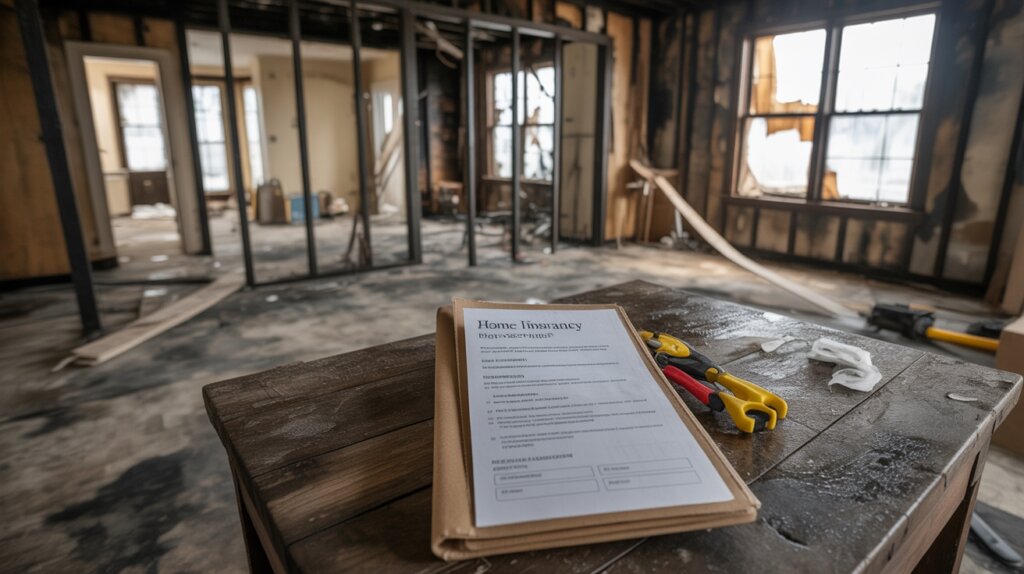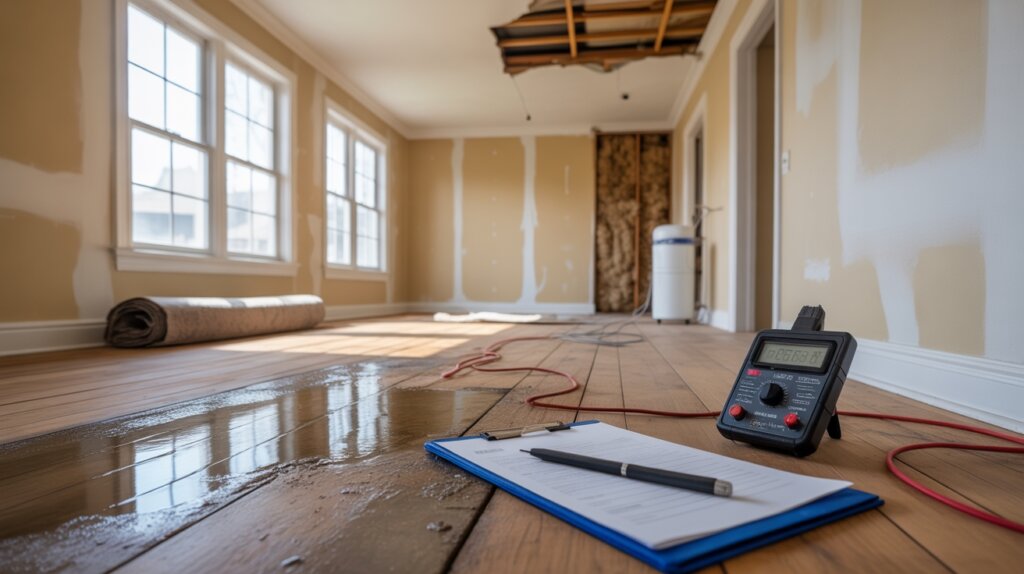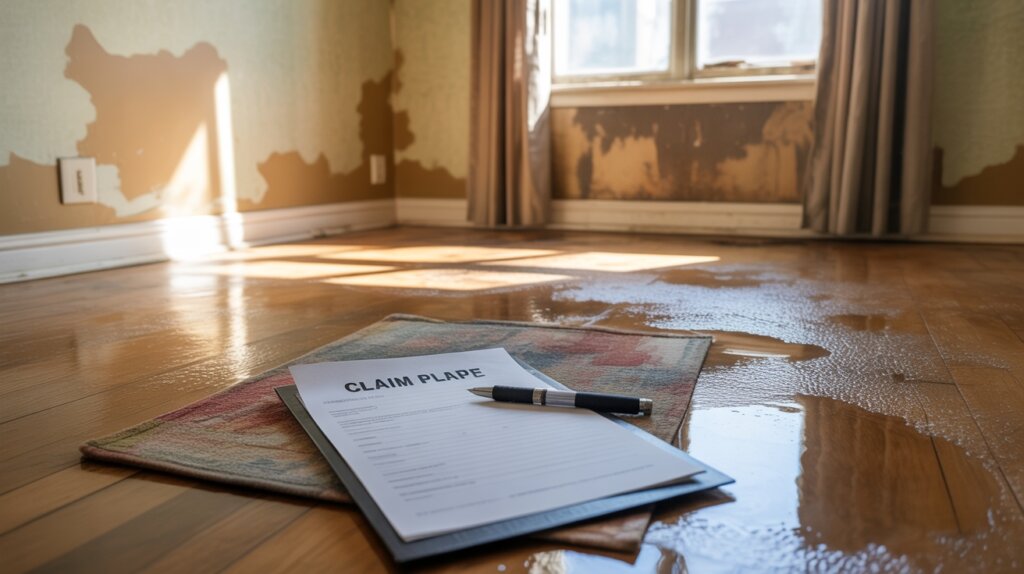Selling a house with water damage can be stressful and confusing. Many homeowners worry about what costs they might face. Understanding what home insurance covers is key before you list your property.
Buyers may hesitate or negotiate hard if they know about water damage. Unclear insurance coverage can delay the sale or reduce your profit. You might even be responsible for expensive repairs if coverage is denied. Home insurance usually covers sudden water damage but not damage caused by neglect or poor maintenance.
Check your policy, document everything, and talk to your insurer before moving forward. This way, you can avoid surprises and protect your interests. This blog will guide you step by step so you can sell your water-damaged house with confidence.
Key Takeaways
- Home insurance generally covers sudden and accidental water damage, such as from burst pipes or storms, but not gradual leaks or neglect.
- Damage from poor maintenance, long-term leaks, or unresolved issues is typically excluded from standard home insurance policies.
- Flood damage is not covered by standard policies and requires separate flood insurance for protection during a home sale.
- Sellers must disclose all water damage and related insurance claims, including repairs and timing, to comply with legal requirements.
- Proper documentation and prompt repairs supported by insurance claims help protect property value and facilitate smoother real estate transactions.
Understanding Water Damage Types

Water damage is not all the same when selling a house. Insurance providers look at the cause before approving any claims. You must know the source of the water damage to understand what your policy covers.
Storm damage, like rain or flooding, is different from plumbing leaks. Insurance will treat a sudden pipe burst differently than a slow, unnoticed leak. The way damage happens affects what repairs are covered.
Mold often appears after water damage if not fixed quickly. Insurance companies may require evidence that you acted fast. If you want coverage for mold removal, you should keep detailed records and respond quickly to the problem.
Additionally, understanding the title and ownership status of the property can influence claims related to water damage and repairs. Recognizing the potential for liens and legal complications is also important when dealing with water-damaged properties, especially during the sale process.
Common Causes of Water Damage in Homes
Water damage in homes often happens because water gets inside where it should not. Common causes include damaged roofs, bad seals on windows, and clogged gutters. If you know these causes, you can take steps to protect your home.
Basements can flood if drainage is poor or if there are cracks in the foundation. Plumbing leaks from burst pipes, old water heaters, or broken appliances also lead to damage. Any unnoticed leak, even a small one, can create mold or harm the structure. Understanding step-up in basis can help homeowners see the importance of maintaining proper documentation for potential tax benefits during sale.
HVAC systems that do not work well might add extra moisture to the air. If you spot these problems early, you can fix them before they get worse. Fixing these issues can help avoid bigger repairs when selling your home.
Proper maintenance of the property’s title deed and understanding the probate process can also help prevent water damage claims during sale.
How Standard Home Insurance Handles Water Damage

Standard home insurance covers sudden and accidental water damage. It does not cover damage from ongoing leaks or poor maintenance. You should know what your policy includes and excludes. Undisclosed liens can sometimes complicate claims if they are discovered later, so understanding your coverage is crucial. Insurers usually exclude damage caused by neglect or unresolved leaks.
They focus on damages that happen unexpectedly, like burst pipes. If you maintain your home, you may avoid claim issues. A comprehensive understanding of home selling myths can help you better navigate the process and avoid common pitfalls. You must show you have tried to prevent mold and kept appliances in good shape. If you file a claim, provide records of repairs and inspections. Good documentation can help your claim get approved.
Sudden vs. Gradual Water Damage: What’s Covered
Home insurance treats sudden and gradual water damage differently. Sudden events like burst pipes are usually covered. Gradual problems, such as slow leaks, are often not covered. Insurance policies typically exclude coverage for damage that develops over time due to neglect or maintenance issues, emphasizing the importance of regular inspections and repairs.
Insurers often pay claims for accidental damage, such as storms. They usually deny claims for damage that builds up over time. Buyers and insurers will check how and when the water damage happened.
The table below shows what is commonly covered:
| Type of Water Damage | Common Coverage Response |
|---|---|
| Burst Pipe | Usually Covered |
| Storm Damage | Usually Covered |
| Gradual Pipe Leak | Often Not Covered |
| Mold Growth from Leaks | Often Not Covered |
You should record the source and timing of water damage. Good records can help with your insurance claim. Detailed documentation can also make selling your house easier. Proper documentation is essential for resolving insurance disputes and ensuring coverage.
Exclusions in Typical Homeowner Policies

You’ll find that most homeowner policies contain strict exclusions related to water damage. Insurers typically won’t cover gradual issues, problems caused by neglect or poor maintenance, or damage from floods and sewer backups. Understanding these limitations is crucial as you assess your coverage and potential liabilities when selling a water-damaged house.
Additionally, if you plan to keep or sell the property, knowing whether the policy covers buyout transactions or future sale considerations can help you make informed decisions. It’s also important to recognize that local market conditions can influence insurance coverage options and costs, especially in areas prone to water-related risks.
Gradual Damage Limitations
Home insurance does not cover damage that happens slowly over time. If you have water issues that developed gradually, insurance will likely not help. Most policies only cover sudden and accidental problems.
Gradual damage includes things like slow leaks, ongoing moisture, or old pipe corrosion. Mold caused by long-term dampness is usually not covered. If you need to fix these problems, you may have to pay yourself.
A professional inspection can help find hidden gradual damage before you sell. If you review your policy, you can better plan repairs and set realistic expectations. Knowing these limits helps avoid surprises during the sale process.
Negligence and Maintenance Exclusions
Most home insurance policies do not cover damage caused by negligence or poor maintenance. If you do not make needed repairs, your insurer may reject your claim. Paying attention to small problems early is important for coverage.
Insurers expect you to fix issues like leaky pipes or clogged gutters. If you ignore these, any resulting damage is not covered. Prompt repairs are usually necessary for claims to be paid.
The table below shows examples of what is and is not covered:
| Scenario | Insurance Coverage |
|---|---|
| Ignoring a dripping faucet | Not covered; considered negligence |
| Failing to clean gutters | Not covered; maintenance neglect |
| Promptly repairing leaks | Typically covered |
| Overlooking roof damage | Not covered; maintenance failure |
| Addressing water issues | Usually covered |
Knowing these rules can help you avoid denied claims when selling your home. If you keep up with maintenance, your chances of coverage are higher. Always act quickly when problems appear.
Flood and Sewer Backup
Most standard home insurance does not cover flood or sewer backup damage. Homeowners often discover this only after damage occurs. These exclusions are usually found in the fine print of your policy.
You must know that selling a house with water damage can be complicated. Insurance usually will not help unless you bought extra coverage. Your responsibility is to understand what your policy does and does not cover.
Flood damage requires a separate flood insurance policy. Sewer backup is only covered if you buy an added endorsement. If you file a claim without this coverage, it will likely be denied.
Always review your insurance details carefully. If you want full protection, consider adding flood and sewer backup coverage. This can help you avoid unexpected costs when selling your home.
The Role of Flood Insurance
You’ll need to understand that standard home insurance doesn’t cover flood damage, so flood insurance becomes essential if your property has water-related issues. You should examine what flood insurance actually covers, what exclusions or limitations apply, and how the claims process works. This knowledge lets you accurately assess your financial risk and prepare for questions from buyers.
Additionally, reviewing recent home sale prices of comparable properties can help you better understand the market value and set appropriate expectations. Conducting a thorough building exterior inspection can also reveal the extent of water damage and inform your insurance and selling strategy.
Flood Insurance Coverage Basics
Flood insurance protects your home from damage caused by flooding. Standard home insurance does not cover flood damage. You need separate flood insurance if your property is in a flood-prone area.
Flood insurance covers direct physical damage from floods. This usually includes the structure, foundation, and built-in systems. It also covers items like plumbing, electrical systems, and major appliances.
If your home is in a high-risk flood zone and you have a federally backed mortgage, flood insurance is required. Sellers should understand what is covered to answer buyers’ questions. Taking water mitigation steps can help support your insurance claim and protect your property’s value.
Exclusions and Limitations
Flood insurance does not cover every type of water damage. Most policies exclude damage from poor maintenance, slow leaks, or sewer backups. If you want full protection, you must know these limits.
Mold claims are often limited or capped. Some policies do not cover mold unless the flood directly caused it and you acted quickly. Always document your actions to support your claim.
Personal belongings in basements and landscaping are usually not covered. You should check your policy for any additional exclusions. Read the policy details to avoid surprises during a claim or sale.
Understanding your policy helps you plan repairs and set realistic expectations. If you know the limits, you can decide on extra coverage if needed. Always ask your insurer about specific exclusions before you buy.
Claim Process Overview
Flood insurance claim steps help protect your property and support a successful home sale. Flood insurance usually pays for structural repairs but often excludes cosmetic fixes or pest damage from moisture. Understanding the process lets you avoid problems and delays.
You should contact your insurer right away when water damage happens. Always take photos and keep receipts to support your claim.
An insurance adjuster will visit your home to check the full damage. The inspection includes hidden issues and potential pest or cosmetic repairs.
Carefully review the settlement offer from your insurer. If you notice missing items, you can ask for corrections. Always make sure the claim covers all eligible repairs.
Filing a Claim for Water Damage Repairs
To get repairs covered, you should file a claim with your home insurance provider as soon as possible. Quick action helps you fix the water damage and keeps your coverage in place. Always check your policy to make sure water damage is included. When contacting your insurer, give clear details about the damage. Provide photos, videos, and a list of what was harmed. If possible, include estimates from contractors for the repair costs.
Your insurance company may send an adjuster to check the damage. Prepare to show them all your documentation. If your policy covers the damage, they will guide you on the next steps. Additionally, understanding the extent of your coverage can help you navigate the claims process more effectively. Familiarize yourself with insurance claim procedures to ensure a smooth process. Use the table below to keep your claim organized:
| Step | What to Prepare | Why It Matters |
|---|---|---|
| Notify Insurer | Contact details | Begins the claims process |
| Document Damage | Photos, videos | Gives proof for your claim |
| Gather Estimates | Contractor quotes | Shows how much repairs may cost |
| Review Policy | Policy documents | Confirms what is covered |
| Schedule Inspection | Meet adjuster | Checks the full damage amount |
How Claims Affect Your Selling Process
When you file a water damage claim, you’ll need to consider its effect on your home’s value and your legal obligations to disclose it to buyers. Claims history can lower property appeal and even influence offers.
It’s crucial to understand disclosure requirements so you protect yourself from future disputes. Additionally, understanding when to sell your house to a cash buyer can help you navigate quick sales if your situation demands urgent action.
Impact on Property Value
Water damage insurance claims can lower your property’s value. Buyers often view homes with past water damage as risky. This can make your home less attractive in the market.
Buyers may worry about hidden issues, even after repairs. If a water damage claim exists, some buyers might offer less money. You may also need to answer more questions during the selling process.
Lenders and appraisers can lower your home’s value because of a claim history. If this happens, you could get a lower appraisal. Homes with past water damage may also stay on the market longer.
If you address these concerns early, you might improve your chances of a smooth sale. Sharing repair details and inspection reports can help build buyer trust. Consider these steps if you want to sell without delays.
Disclosure Requirements Explained
You must tell buyers about any past water damage or insurance claims. This is a legal requirement when selling your home. If you hide this information, you could face legal problems later.
Buyers may ask for repair details and proof that problems are fixed. If you filed claims, buyers might check your home’s claim history. This can affect their decision or their ability to get insurance.
Past claims may lead to higher insurance costs for the next owner. If you disclose everything, you protect yourself from future disputes. Honest information can also make the selling process smoother.
Disclosure Requirements for Sellers
Sellers must follow state laws about telling buyers of water damage. Most states require you to share known water issues and repairs. If you do not disclose, you risk lawsuits or a canceled sale. Sellers are required by most states to disclose known water damage or repairs, or they could face lawsuits or lose the sale.
You should give details about any insurance claims for water damage. Sellers must include when and how the claims were filed. This helps buyers understand the home’s history.
You must explain the type and amount of damage and repairs made. Sellers should give clear details about all water problems and fixes. If any repairs are ongoing, mention them.
Buyers need to know about future or unresolved water risks. If an issue might return, you have to say so. Full disclosure protects you from later trouble.
Impact of Water Damage on Home Value
You’ll notice water damage often lowers your home’s marketability, as buyers see it as a significant risk. You must weigh the cost of repairs against the potential increase in property value to determine if remediation makes financial sense. Understanding this balance is crucial when setting your asking price and negotiating with prospective buyers.
Decreased Property Marketability
Water damage can make your home much harder to sell. Buyers often avoid homes with any signs of water issues. Even luxury upgrades do not make up for water-related problems.
A house with water damage will attract fewer interested buyers. Many people do not want to risk paying for repairs or future problems. This situation can limit your choices when selling.
Homes with known water damage often stay on the market longer. If this happens, your property may seem less desirable. You might have to accept lower offers as buyers consider repair costs.
If you want to protect your home’s value, you should fix water damage quickly. Addressing these issues can help keep your property appealing to buyers. Taking action early can make selling your home much easier.
Repair Costs Versus Value
Repair costs for water damage often exceed the value they add to your home. Most repairs, like drying and replacing materials, are expensive. Even if insurance helps, you may still pay a large part.
If you hope to sell, buyers may hesitate if your home has a water damage history. Proper repairs and clear records can help, but doubts often remain. Value increases are usually small compared to what you spend.
You should compare repair costs to possible gains before starting work. If repairs are not complete and well-documented, you might lose money. Careful planning is important to avoid extra financial loss.
Negotiating With Buyers Over Damage
Negotiating with buyers over damage can be challenging, especially if there is water damage in the home. Water damage often lowers a home’s value and makes buyers cautious. Sellers must be honest and well-prepared in these negotiations.
Sellers should provide accurate repair estimates to show the real cost of fixing the damage. Detailed estimates can support your asking price and build trust with buyers. If you are transparent, buyers may feel more comfortable making an offer.
You must disclose any known water damage and explain the steps taken to fix or prevent further issues. Buyers will likely include repair costs in their offers, so expect lower offers or requests for credits. If buyers do their own inspections, be ready to discuss their findings and negotiate based on those results.
Repairing Before Listing: Insurance Considerations
Homeowners must consider insurance rules when repairing water damage before listing a home. Insurance may cover certain types of water damage, but not all. If you do not check your policy, you might miss what is excluded.
Check your insurance policy before repairing water damage—coverage varies, and you could miss key exclusions that affect your home sale.
You should report water damage to your insurer as soon as possible. If you wait, your claim may be denied. Proper documentation of all damage is important for your claim.
Most insurers require you to prevent further damage right away. If you do not act quickly, your coverage could be affected. Always use approved contractors and keep all receipts.
If you fail to meet your policy requirements, your claim might be denied. This could delay repairs and make your home harder to sell. Following all insurance steps helps protect your property’s value.
Supplementary Coverage Options to Consider
Supplementary coverage options can provide extra protection when selling a water-damaged house. Standard homeowner’s insurance often does not cover every risk. If you want to be fully protected, you should consider these extra policies.
A home warranty can help cover the cost of fixing or replacing systems and appliances harmed by water. This option gives reassurance to both sellers and buyers. If something breaks after the sale, the warranty may help pay for repairs.
Pest inspection coverage is useful because water damage can attract insects or rodents. A standard policy may not pay for pest-related repairs. If you want to avoid surprises, consider adding pest inspection coverage.
Flood insurance is important if your home is in a flood-prone area. Most standard policies do not cover flooding. If you want to close coverage gaps, adding a flood insurance rider can help.
If you review these options, you can better protect your sale. Buyers may feel more confident if you have extra coverage. These additions can help prevent problems during the selling process.
Tips for Protecting Your Investment During the Sale
To protect your investment when selling a water-damaged house, take careful steps before closing. Good documentation helps you avoid financial loss. Careful planning can prevent future problems.
Take clear photos of all water damage. Save receipts for any repairs you make yourself. These records show buyers and insurers that you acted responsibly.
Be honest with buyers about past water issues and repairs. Hidden problems can lead to disputes after the sale. If you disclose everything, you reduce risks.
Get a professional inspection to check for hidden damage. Moisture and pests often remain after water problems. Fixing these early can prevent future claims.
Contact your home insurance company before selling. Update them on repairs and the sale process. If you keep your policy current, you stay protected until closing.
Conclusion
If you plan to sell a water-damaged house, review your home insurance policy carefully. If you understand your coverage, you can avoid unexpected costs. If you document damages and follow your policy’s rules, you protect your interests.
If you want a faster solution, consider selling your house for cash. Some companies, like us, buy houses in any condition. If you choose this route, you can avoid repairs and lengthy negotiations.
If you are ready to sell your water-damaged house, we can help. At Greg Buys Houses, we make fair cash offers and close quickly. Contact us today to get started and sell your house with less stress.

